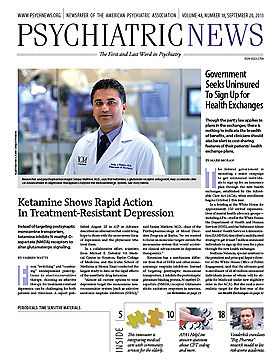Who would have thought that childhood functional abdominal pain—that is, periodic abdominal pain that cannot be attributed to organic disease— might presage anxiety and depression later in life?
Yet that is what data from a new study indicate.
The study was headed by Lynn Walker, Ph.D., a professor of pediatrics and director of the Division of Adolescent Health at Vanderbilt University. The findings were published online August 12 in Pediatrics.
Walker and colleagues studied 332 children who had received extensive medical evaluations and were found to have functional abdominal pain, as well as 147 age-matched children from the same area who did not experience such pain.
The subjects were reassessed during adolescence and early adulthood to determine whether they experienced anxiety disorders or depressive disorders.
The researchers found that 51 percent of the subjects who had experienced chronic abdominal pain as youngsters met criteria for an anxiety disorder at some point during the follow-up period, and 30 percent currently met criteria for an anxiety disorder.
In contrast, only 20 percent of controls met criteria for an anxiety disorder at some point, and just 12 percent met criteria for a current anxiety disorder.
Regarding depressive disorders, the lifetime risk among the subjects was significantly higher in the abdominal-pain group than in controls—40 percent versus 16 percent—but current depressive disorders were rare at follow-up and did not differ significantly between the two groups. The reason for this latter finding, the researchers suggested, may be that depression follows a more episodic course than anxiety disorders, and therefore they “did not detect increased risk at the single snapshot evaluation conducted in adolescence or early adulthood.”
Thus it appears that functional abdominal pain in childhood predicts a long-term increased risk for developing anxiety disorders and possibly depressive disorders as well.
The findings have implications for psychiatrists, Walker told Psychiatric News, highlighting that “a biopsychosocial approach is most effective in the treatment of chronic or recurrent pain. Psychiatrists are important members of the multidisciplinary team as they can identify and treat psychosocial issues that may be missed in a medical evaluation that focuses primarily on ruling out disease. Psychiatrists can be particularly helpful,” he added, “in explaining to patients that the relationship between anxiety and pain is not necessarily cause-effect, but rather that anxiety and pain interact with each other in a vicious cycle. By reducing anxiety, we can begin to break that cycle.”
“This is an important study conducted by an outstanding group of researchers,” John Campo, M.D., chair of psychiatry at Ohio State University, said during an interview. Campo published seminal research on the subject in the July 2001 Pediatrics.
“A cross-sectional relationship between functional abdominal pain and anxiety has been noted in multiple studies in children, adolescents, and adults, but the nature of this observed ‘comorbidity’ is unclear. Though unidirectional causal models (i.e., functional abdominal pain causes the associated anxiety or vice versa) have been entertained, this study’s findings that functional abdominal pain and anxiety are associated longitudinally into adulthood offers some support for the notion that functional abdominal pain and anxiety may share common risk factors or perhaps even be manifestations of a common disorder.”
Yet another reason to believe that functional abdominal pain is closely related to anxiety, and perhaps to depression, was the discovery that anxiety and depression are implicated in irritable bowel syndrome and that antidepressants can help some irritable bowel syndrome patients (Psychiatric News, September 21, 2007).
The study was funded by the National Institutes of Health, the Vanderbilt Kennedy Center, and the Vanderbilt Digestive Disease Research Center. ■

